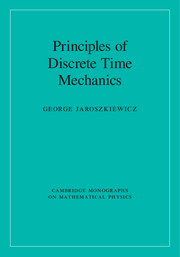Book contents
- Frontmatter
- Contents
- Preface
- Part I Discrete time concepts
- 1 Introduction
- 2 The physics of discreteness
- 3 The road to calculus
- 4 Temporal discretization
- 5 Discrete time dynamics architecture
- 6 Some models
- 7 Classical cellular automata
- Part II Classical discrete time mechanics
- Part III Discrete time quantum mechanics
- Part IV Discrete time classical field theory
- Part V Discrete time quantum field theory
- Part VI Further developments
- Appendix A Coherent states
- Appendix B The time-dependent oscillator
- Appendix C Quaternions
- Appendix D Quantum registers
- References
- Index
1 - Introduction
from Part I - Discrete time concepts
Published online by Cambridge University Press: 05 May 2014
- Frontmatter
- Contents
- Preface
- Part I Discrete time concepts
- 1 Introduction
- 2 The physics of discreteness
- 3 The road to calculus
- 4 Temporal discretization
- 5 Discrete time dynamics architecture
- 6 Some models
- 7 Classical cellular automata
- Part II Classical discrete time mechanics
- Part III Discrete time quantum mechanics
- Part IV Discrete time classical field theory
- Part V Discrete time quantum field theory
- Part VI Further developments
- Appendix A Coherent states
- Appendix B The time-dependent oscillator
- Appendix C Quaternions
- Appendix D Quantum registers
- References
- Index
Summary
What is time?
This book explores the hypothesis that time is discrete rather than continuous. Time is an enigma, so we should expect some metaphysics and philosophy to creep into the discussion. Our inclination is to avoid those disciplines as much as possible, so let us deal with them right now.
Metaphysics and philosophy deal with statements and conjectures that cannot be empirically validated. In those disciplines there are constant references to absolutes such as existence, good and bad, and suchlike without further qualification, as if everyone accepted them as meaningful concepts. Absolutes are the key things we wish to avoid. For the record, we define an absolute statement as one that is considered to be true regardless of any caveats or criteria, i.e., context-free. In contrast, a contextual statement has a truth value that is meaningful only relative to its particular context.
The idea that physical truth can be contextual is an unfamiliar and uncomfortable one to physicists conditioned to believe that the laws of physics transcend the context of observation because they can be empirically validated. In fact, that is a circular line of reasoning. Every experiment is defined by its own context and experimentalists have to work hard to create that context: the search for the Higgs particle at the Large Hadron Collider did not happen overnight.
- Type
- Chapter
- Information
- Principles of Discrete Time Mechanics , pp. 3 - 23Publisher: Cambridge University PressPrint publication year: 2014

